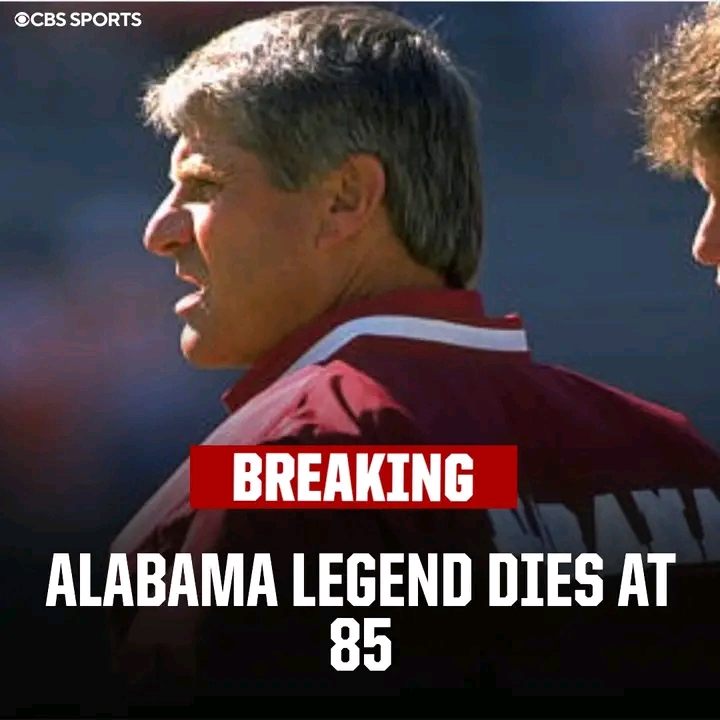Crimson Tide Mourns: Bill Oliver, Key Figure in Five National Championships, Dies at 85
The University of Alabama and the entire college football community are in mourning following the passing of Bill Oliver, affectionately known as “Brother” Oliver—a man whose strategic genius and unwavering dedication were cornerstones of five national championship victories. Oliver, 85, leaves behind an extraordinary legacy that spans decades on the gridiron and in the coaching box, forever intertwining his name with the proud history of the Crimson Tide.
A Storied Legacy on the Field
Born in rural Alabama in 1939, Bill Oliver quickly emerged as a standout athlete. He donned the crimson and white as a defensive back under legendary coach Paul “Bear” Bryant between 1959 and 1961. His time as a player was punctuated by intense competition and remarkable teamwork, culminating in a key role on the 1961 championship squad—a feat that would set the stage for his lifelong commitment to the sport.
“Playing for Alabama wasn’t just about football—it was about embracing a tradition of excellence,” Oliver once remarked. His early experiences on the field instilled in him the values of hard work and resilience, principles that would define his later coaching career.
A Maestro of Defense and Leadership
After hanging up his cleats, Oliver transitioned into coaching with the same fervor he exhibited as a player. His coaching career began in earnest during the 1960s, when he served as a defensive backs coach at Auburn University. He would later return to Alabama, where from 1971 to 1979 he molded defensive playmakers, contributing to multiple championship campaigns during a transformative era for the Crimson Tide.
Oliver’s strategic mind was not confined to one institution. He took the helm as head coach at the University of Tennessee at Chattanooga in the early 1980s, compiling an impressive record and earning accolades as a program builder. His coaching journey also led him to valuable stints with the Memphis Showboats of the USFL and a notable chapter at Clemson University, where he fortified defenses as both a defensive backs coach and a defensive coordinator.
One of the crowning achievements of his career came during his return to Alabama in the early 1990s as defensive coordinator. In the 1992 Sugar Bowl, his meticulously prepared defense held the formidable Miami offense to just 13 points, a performance that propelled the Crimson Tide to a national championship and forever etched his reputation as a defensive mastermind.
An Enduring Impact on College Football
Throughout his career, Bill Oliver was more than a coach—he was a mentor, a strategist, and an inspiration. His insights and methods have influenced countless players and coaches, many of whom credit Oliver for instilling in them the principles of teamwork, discipline, and the relentless pursuit of excellence. In 2013, his contributions to Alabama sports were formally recognized with his induction into the Alabama Sports Hall of Fame, a testament to his profound impact on the game.
Teammates and former colleagues alike remember him as a humble man with a fierce determination. “Bill was the heart and soul of Alabama football,” said a veteran assistant coach. “His legacy is not just in the championships we won, but in the spirit of the game that he passed on to generations of athletes.”
Remembering a Legend
As the Crimson Tide and their supporters come to terms with the loss of Bill Oliver, tributes continue to pour in from across the nation. Former players recall his unwavering mentorship, while rival coaches acknowledge the rare blend of humility and intensity that made him a unique figure in college football history.
Family members report that Oliver passed peacefully at his home, surrounded by loved ones who shared in his passion for the game. Funeral arrangements are expected to be announced in the coming days, with many anticipating a service that will celebrate not only the life of a great coach and player but also the enduring spirit of Alabama football.
Bill “Brother” Oliver’s influence on the game transcends wins and losses. His contributions, both on and off the field, have left an indelible mark on the sport he loved. As fans and former colleagues reflect on his storied career, his legacy will continue to inspire future generations to strive for greatness—upholding the rich tradition of excellence that is the hallmark of the Crimson Tide.






















